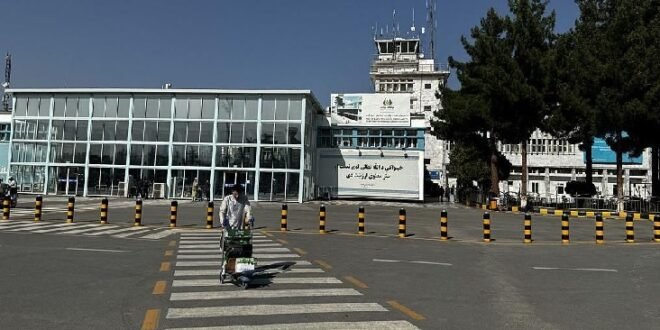03-10-2025
KABUL: Afghanistan’s main airport is at a standstill as the country grapples with the fallout of a nationwide internet shutdown imposed by the Taliban government.
 The Taliban has yet to give an official reason for the decision, which took effect on Monday but did say it would last until further notice. The UN said it risked inflicting significant harm.
The Taliban has yet to give an official reason for the decision, which took effect on Monday but did say it would last until further notice. The UN said it risked inflicting significant harm.
Communication within Afghanistan, and out to the wider world, has been severely affected, as have essential services including banking and payments and access to online education, a lifeline for many women and girls.
Kabul airport, meanwhile, was “nearly deserted”, according to one resident, with no evidence of planes arriving or leaving.
#Flight tracking service Flightradar24 showed that a handful of incoming and outgoing flights on Tuesday had been cancelled. Many more simply had their status marked as “unknown”.
One passenger who planned to fly into Kabul International Airport on Tuesday was told there would be no flights until Thursday at the earliest.
Another local said all flights from Kabul airport had been cancelled since Monday evening. He added that life in Kabul “seems to be normal” but added that there was “no communication at all” across the country.
The United Nations mission in Afghanistan called on the Taliban authorities to immediately and fully restore nationwide internet and telecommunications access.
“The cut in access has left Afghanistan almost completely cut off from the outside world, and risks inflicting significant harm on the Afghan people, including by threatening economic stability and exacerbating one of the world’s worst humanitarian crises,” it said in a statement.
 The Taliban government have for weeks been severing fiber-optic internet connections across several provinces.
The Taliban government have for weeks been severing fiber-optic internet connections across several provinces.
It began in a handful of provinces, but did not impact the capital Kabul until Monday, with several people telling the BBC their fibre-optic internet stopped working towards the end of the working day, around 17:00 local time (12:30 GMT).
And on Tuesday, many awoke across the country to find essential services paralyzed.
Najibullah, a 42-year-old shopkeeper in Kabul, told media that residents felt like they were left “blind without phones and internet”.
“All our business relies on mobiles. The deliveries are with mobiles. It’s like a holiday, everyone is at home. The market is totally frozen.”
Another Kabul local, who did not wish to be identified, said that banks across the capital were open but that there were huge crowds wanting to withdraw money but that only “very little cash” could be paid out.
However, a money changer in the country’s southern Helmand province said all banks in his area were closed and that he was not able to process payments.
Diplomatic officials had earlier warned media that the internet cuts could affect banking and e-commerce systems nationwide.
International news agencies also say they have lost contact with offices in the capital Kabul. Mobile internet and satellite TV has also been severely disrupted across the country.
Tolo News, a privately owned Afghan news channel, told people to follow its social media pages for updates as it expected disruptions to its television and radio networks.
One Kabul journalist told that they were unable to even call or contact guests for interviews and needed to send camera crews directly to their interviewees’ homes. (Int’l News Desk)
 Pressmediaofindia
Pressmediaofindia




